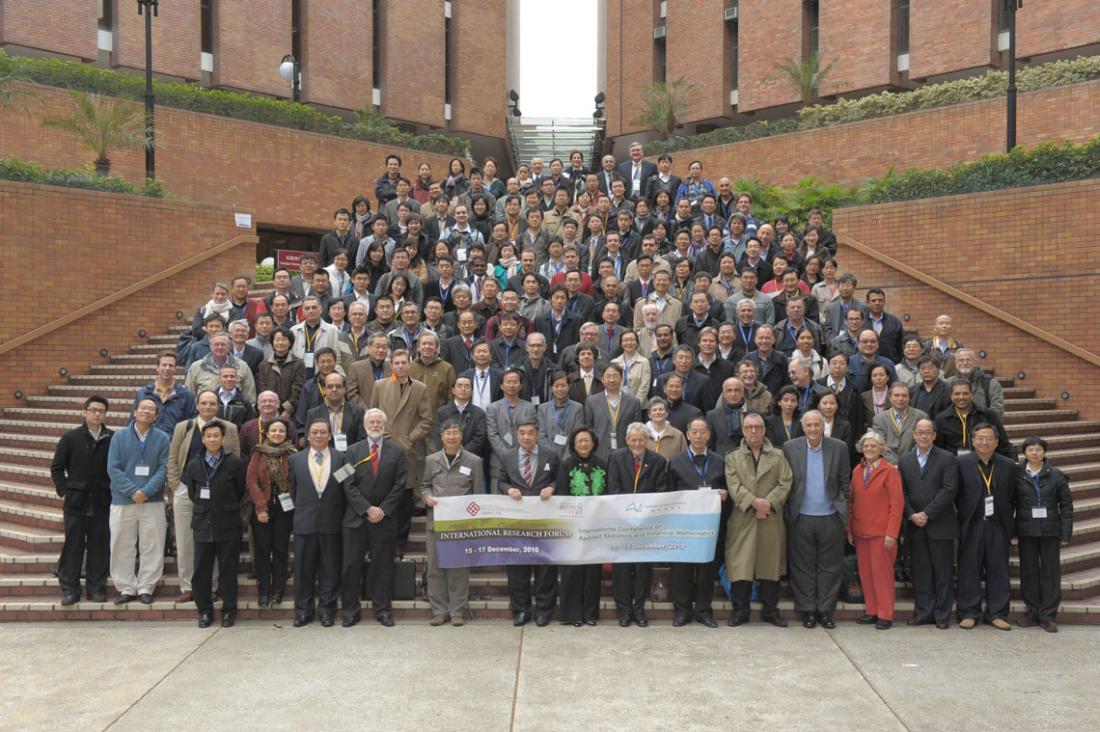Group photo
To identify the future direction of education and research, The Hong Kong Polytechnic University (PolyU) and The University of Texas at Dallas (UT Dallas) jointly organized a cross-discipline international forum. The event, themed What can the Academic Community Learn from the Global Crisis? Models, Methods and Transfer, was held from 15 to 17 December 2010 on the PolyU campus.
Addressing the opening ceremony were PolyU Vice President (Academic Development) Professor Walter W. Yuen, Vice President (International and Executive Education) and Graduate School of Business Director Professor Judy Tsui, Faculty of Business Acting Dean and Associate Dean (Programmes, Teaching & Learning) Professor Howard Davies, UT Dallas School of Management Dean Professor Hasan Pirkul, and Ajou University School of Business Administration Dean Professor Chang Hwan Lee.
Professor Yuen said that the global economic crisis illuminated academia on a thorough evaluation of its research and education, and that it needs "an adequate understanding of the visions of all its stakeholders, industrialists, as well as policy and decision makers". Professor Tsui commented that with 90 academics and industry experts as chairs of discussions and speakers from across the world, including US, Switzerland, France, Australia, Korea, Thailand and mainland China, the event used a "truly interdisciplinary approach" to explore how education should change in response to the global financial crisis in 2008. Professor Davies said that the primary concern of the university and the faculty is that their research and education are always relevant to real-world needs.
The Forum, comprising a round table discussion and 15 parallel sessions on a range of topics covering quantitative finance and behavioural finance, corporate governance, risk management, economic modeling, stochastic control, insurance, energy and commodities, attracted 200 participants from academia and the business sector.
The roundtable, titled "Education and Training: Lessons from Global Crisis", featured a discussion of business as an art, science or social science. While there has been a consensus that research is crucial to understanding the changing environment, the panelists were concerned about how research findings inform teaching. The global crisis underlined the importance of respect for science in business, not only by educators and researchers but also by industry, in particular senior management and CEOs.
On 16 December, there was a featured presentation on "Anti-Fragility in the Black Swan Domain" by Professor Nassim Nicholas Taleb, Distinguished Professor of Risk Engineering & Co-Director of the Research Center for Risk Engineering at the Polytechnic Institute of New York University. Professor Taleb emphasized a new difficulty, beyond the inadequacy of standard approaches of probabilistic models, which has been one of his main previous messages. This time, he stressed the difficulty of calibrating correctly models, even those based on Gaussian assumptions. In case it really can mislead it is better not to use them, like as he said, nobody will use a map of Saudi Arabia, to travel above the Himalayas. Professor Taleb is a trader turned scholar of applied probability and risk management. Among his books, The Black Swan was the bestseller in the world in 2007 and 2008. His books have more than 1.4 million copies and 51 translations in print.
*****
Ms Wendy Wong, Faculty of Business
Tel: (852) 3400 2582
Email: [email protected]



